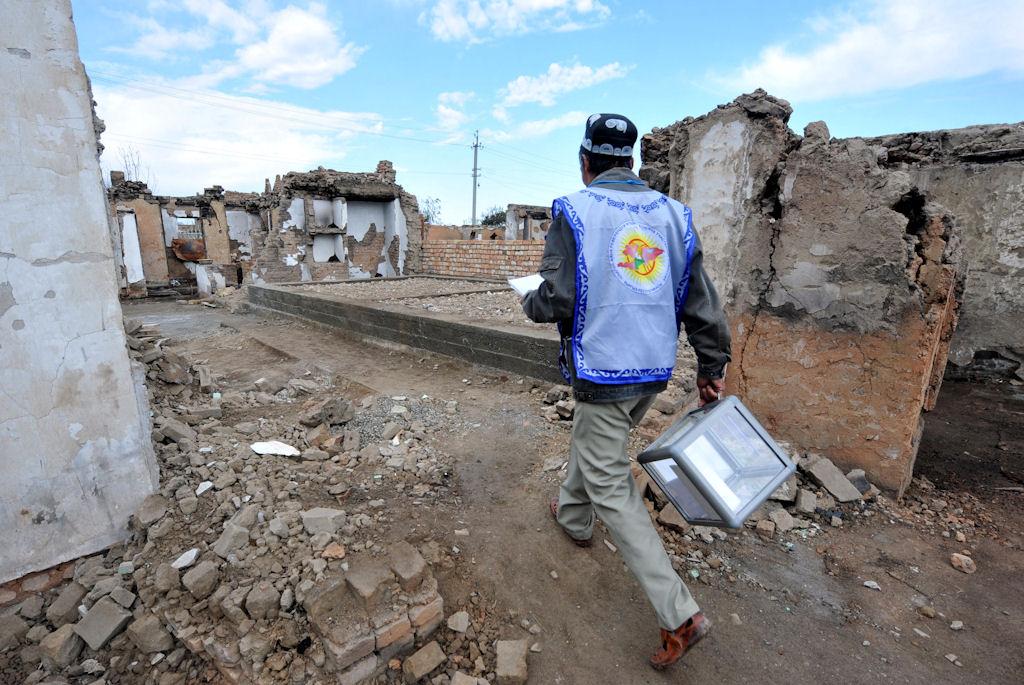Kyrgyzstan inquiry lays blame for Osh ethnic violence
A member of the local electoral committee walks with a ballot box through the destroyed homes of ethnic Uzbeks in Osh, Kyrgyzstan on Oct. 10, 2010.
KIEV, Ukraine — One thing is clear: There will be the fallout from the international investigation into the bloody ethnic clashes in Osh, Kyrgyzstan last year. But will it contribute to stability in the fragile central Asian state, or undermine it? And will those government officials who were implicated in the report as abetting the violence actually be called to justice?
Last week, the Kyrgyzstan Inquiry Commission (KIC), an international body led by Finnish parliamentarian Kimmo Kiljunen, unveiled its much-anticipated findings after a year’s investigation into the June 2010 events, during which ethnic Kyrgyz and Uzbeks battled in the streets of Osh over several days.
The report delivered a number of bombshell conclusions that contradicted the official government version of the bloodshed, but had been by confirmed eyewitness accounts at the time.
The KIC said that, “while both communities suffered loss,” of the 470 dead, the vast majority — 74 percent — were ethnic Uzbeks. (About 58 percent of the approximately 1,900 who were treated for injuries were ethnic Kyrgyz. The total number of injured could be much higher, however, the KIC said.)
What’s more — and potentially more destabilizing — the report said that local security forces may have been complicit in the attacks, and some government officials played a contributing role by doing little to stop the killing.
“The role of the security forces was significant,” the report said, adding elsewhere: “In many instances crowds of attackers seized firearms and ammunition from the military and police in circumstances largely unopposed by troops or officers. Armored personnel carriers (APCs) were also surrendered.”
Though the acts of violence could not be called genocide, they were, in the commission’s opinion, “crimes against humanity.”
“These are murder, rape, other forms of sexual violence, physical violence … and persecution against an identifiable group on ethnic grounds,” the report said.
Lastly, the KIC said that government authorities disproportionately arrested and then tortured ethnic Uzbeks in the post-violence arrests — and that this may be ongoing.
Kyrgyz President Roza Otunbayeva now finds herself in a sticky situation, with potentially far-reaching political ramifications. Kyrgyzstan and her own grip on power are steadier than one year ago, after an April revolution and then the June clashes, but the situation in the country is by no means rock solid.
Although her government invited the commission to investigate the Osh events, it has rejected the conclusions, saying that the previous administration of deposed President Kurmanbek Bakiyev was to blame, and that both ethnic Kyrgyz and Uzbeks suffered equally.
“Circumstances from which the conflict arose were not due to the provisional government and were not from the events of April-May 2010,” the government said in a statement. “They were a result of protracted policies implemented by former regimes.”
“Kyrgyzstan considers it completely unacceptable that the documents clearly display an overwhelming tendency that only one ethnic group has committed crimes, ignoring the victims and deaths of this very group,” the statement added.
The KIC, backed by international human rights organizations, called for the government to now take action against those accountable, possibly setting up a truth and reconciliation commission. This was crucial for Kyrgyzstan’s future stability, they said.
“Kyrgyzstan’s authorities must urgently investigate and prosecute those responsible for human rights violations during unrest in June 2010,” Amnesty International said in statement.
“The failure to ensure that justice is done will undermine the rule of law, encourage corruption and criminality and sow the seeds of future turmoil and human rights violations,” it continued.
But Otunbayeva may be loath to do this: taking on security services and political power brokers in Kyrgyzstan could cause a considerable political backlash — especially since many ethnic Kyrgyz continue to maintain that the Uzbeks were to blame for the June events.
Two powerful local officials were singled out for criticism by the KIC: Ismail Isakov, the southern commandant at the time of the violence, and Kubatbek Baibolov, who was then responsible for the southern town of Jalabad and was until March prosecutor general. Both men were said to have done little to stop the violence.
Osh’s ethnic Kyrgyz mayor, Melisbek Myrzakmatov, who also was censured in the report, lashed out at the KIC and perhaps indicated further action against local Uzbek leaders.
“The main cause of the bloodshed in the south was separatist appeals of leaders of Uzbeks diasporas in Kyrgyzstan,” he said, as quoted by the Kyrgyz news agency 24.kg. “Separatists and their backstage sponsors have to incur liability and bear the punishment they deserve.”
Every day, reporters and producers at The World are hard at work bringing you human-centered news from across the globe. But we can’t do it without you. We need your support to ensure we can continue this work for another year.
Make a gift today, and you’ll help us unlock a matching gift of $67,000!
